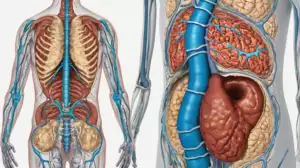Living with multiple sclerosis (MS) can be challenging, but hope is abundant with the growing variety of alternative treatments for multiple sclerosis. From complementary therapies to cutting-edge natural solutions, these approaches can help improve quality of life and ease symptoms. This blog dives into seven remarkable therapies that offer natural pain relief, support overall well-being, and provide a holistic perspective on managing MS.
Table of Contents
ToggleUnderstanding Alternative Treatments for MS
Multiple sclerosis is a chronic condition affecting the central nervous system, disrupting communication between the brain and body. While conventional medications are effective for many, some individuals seek complementary and alternative medicine to reduce side effects and explore a more natural path.
Alternative treatments for multiple sclerosis focus on easing symptoms like pain, fatigue, and mobility challenges, often improving overall well-being.
1. Mindfulness and MS Management
Mindfulness-based therapies have gained traction as effective tools for managing chronic conditions. For MS, mindfulness can bring remarkable benefits.
How Mindfulness Helps with MS Symptoms
Mindfulness involves focusing on the present moment, reducing stress, and fostering emotional resilience. Studies show that regular mindfulness practice can help MS patients by:
- Reducing stress and anxiety levels.
- Enhancing emotional regulation.
- Improving physical discomfort related to fatigue and muscle tension.
Incorporating Mindfulness into Your Routine
Techniques like meditation, body scans, and mindful movement exercises such as yoga can be seamlessly integrated into daily life. These practices not only contribute to natural treatments for multiple sclerosis but also help maintain a sense of peace.
2. Reflexology: A Touch for Relief
Among complementary therapies for MS, reflexology is a standout option offering natural pain relief through targeted foot and hand massage.
The Science Behind Reflexology
Reflexology works by stimulating specific pressure points on the feet and hands that correspond to other parts of the body. For MS patients, this can mean:
- Improved circulation.
- Reduced pain and muscle stiffness.
- Enhanced relaxation.
Benefits of Reflexology for MS
Regular reflexology sessions have been reported to decrease the intensity of symptoms such as numbness and tingling. Its soothing nature makes it a favourite among those exploring complementary therapies for managing chronic conditions.
3. PEMF Therapy for MS Symptoms
Pulsed Electromagnetic Field (PEMF) therapy is an emerging treatment designed to improve cellular health and function through low-frequency electromagnetic waves.
Why Consider PEMF for MS?
PEMF therapy shows promise in addressing various MS-related issues, including:
- Reducing inflammation, a key factor in MS symptom exacerbation.
- Easing chronic pain and spasticity.
- Supporting overall energy levels.
Getting Started with PEMF
Devices designed for home use make PEMF therapy accessible. It’s a safe, non-invasive option within natural treatments for multiple sclerosis, although consulting your healthcare provider is essential before beginning.
4. The Role of Nutrition and Supplements in MS Management
Dietary choices play a crucial role in overall health, and for MS, certain nutrients may be especially beneficial.
Omega-3 Fatty Acid Supplementation
Omega-3s, found in fish oil, are well-documented for their anti-inflammatory properties. For MS patients, supplementing with Omega-3s can support nerve health and may slow disease progression.
Multiple Sclerosis and Nutrition
Incorporating a nutrient-rich diet filled with fresh vegetables, lean proteins, and healthy fats for multiple sclerosis and nutrition complements other multiple sclerosis treatments. Emerging research suggests diets like the Mediterranean diet may help reduce symptom severity and enhance overall well-being.
Other Complementary and Alternative Therapies to Consider
While mindfulness, reflexology, PEMF therapy, and nutrition play significant roles, other options also contribute to effective MS management.
Acupuncture for MS Pain Relief
Acupuncture has been used for centuries to alleviate pain and promote healing. For MS patients, this technique can reduce neuropathic pain, improve muscle stiffness, and enhance relaxation, making it a valuable tool within complementary and alternative medicine.
Yoga and Tai Chi
Low-impact exercises like yoga and Tai Chi blend physical activity with mindfulness, improving flexibility, balance, and mood. These practices offer a holistic approach to the treatment of multiple sclerosis, ensuring physical and mental wellness.
Frequently Asked Questions
While medication is often essential in managing MS, some patients incorporate natural treatments for multiple sclerosis to complement traditional therapies. Approaches like mindfulness, dietary changes, and reflexology can help alleviate symptoms and improve quality of life. However, it’s critical to consult a healthcare professional before reducing or stopping medication.
Research continues to explore innovative MS treatments. Among alternative options, PEMF therapy for MS symptoms has shown potential in reducing inflammation and improving cell health. Traditional medical breakthroughs, including disease-modifying therapies, also remain promising.
Slowing MS progression involves a combination of approaches:
Adhering to prescribed medications.
Embracing complementary therapies such as mindfulness and acupuncture.
Maintaining a healthy diet rich in anti-inflammatory foods like those containing Omega-3s.
Engaging in regular, low-impact physical activity.
Advancements in multiple sclerosis treatments have significantly improved life expectancy. Most individuals with MS live close to an average lifespan, although factors like disease type and overall health can influence outcomes. Early intervention and holistic care are key.
Conclusion
Exploring alternative treatments for multiple sclerosis opens up new avenues for managing this complex condition. From the mental clarity of mindfulness to the physical relief provided by reflexology and PEMF therapy, these approaches complement traditional treatments and improve quality of life. Always discuss these options with a trusted healthcare professional to ensure they align with your overall care plan.
Holistic, patient-centred care is at the heart of managing MS. By integrating the therapies that resonate most with your lifestyle and needs, you can craft a personalised strategy for living well with multiple sclerosis.
Complementary therapies for MS offer various ways to support symptom management and enhance overall well-being. Practices like mindfulness and MS management techniques help individuals reduce stress and improve focus, while PEMF therapy for MS symptoms can potentially aid in alleviating pain and improving mobility. Additionally, the benefits of reflexology for MS include promoting relaxation and improving circulation, which may help in managing fatigue and discomfort. Integrating these therapies alongside traditional treatments can create a holistic approach to living with MS.




